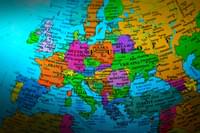
We can leave the EU. But we can’t leave Europe.
The European Union is a facilitator of British influence around the world, argues Andrew Woodcock.
"Fog in the channel. Continent cut off". This oft-ridiculed headline contains a profound truth: regardless of whether we take Europe seriously, it will still be there. Furthermore, our geographical position is always bound to bring challenges, headaches, opportunities and complex networks of interdependencies touching on most aspects of UK public life. These will certainly not go away either.
In fact, the only real choice we have is whether to stick with a broadly effective (if sometimes cumbersome) system for dealing with these interdependencies, while pursuing further reform from the inside. Or else to throw caution to the wind and risk a chaotic approach based on piecemeal, bilateral responses. Day-to-day, the EU is a mechanism that gives some control over this huge array of linkages. By leaving, we discard well-established, extensive structures at all levels of government to manage disputes, facilitate scale-economy gains and promote win-win cooperation.
Who summed this up better than Margaret Thatcher in Bruges? She saw the European project as "a practical means by which Europe can ensure the future prosperity and security of its people in a world in which there are many other powerful nations and groups of nations." And she believed Britain's future was inextricably linked to Europe: "Britain does not dream of some cosy, isolated existence on the fringes of the European Community. Our destiny is in Europe."
These far-sighted words point to the EU giving the UK influence on and dialogue with the rest of Europe far better than we could imagine doing on our own. At its core the EU is a unique creation where members "pool" sovereignty on a range of policies while remaining independent sovereign states with our own unique cultures, customs and languages. By pooling sovereignty, our ability to influence outcomes that matter to us increases overall. Of course, we still retain sovereignty on security, foreign policy and defence while benefiting massively from close intra-EU cooperation. As Tony Blair put it: "We must be prepared to stand alone if necessary. But it is misguided to make perpetual isolation the aim of our policy". And Gordon Brown asked: "Why would you put this country's prosperity and power at risk by placing Britain at the fringe of Europe rather than at its heart?"
Two conclusions follow. Firstly, perceived loss of sovereignty to Brussels is not the true story. Overall, we gain. Especially in such an interconnected system where total sovereignty and control over our country is already an illusion irrespective of EU membership, as the actions, policies and intentions of others will continue to spill over to us. Only with what Thatcher describes as "practical means", can we hope to manage these and mitigate their effects. This surely beats a system of unbridled and potentially destructive nation-state rivalries. Furthermore, leaving the EU will not even allow us to set all the rules that apply to us as we also hand over sovereignty to such organisations as the UN, NATO as the WTO. In fact, we gain influence in these and other international fora by being able to help set the priorities of that highly influential and cohesive international actor called the EU.
Secondly, even in a globalised world, geography matters. We cannot wondrously reposition ourselves in the mid-Atlantic. Europe will still be close by. Worse still, so will the EU itself- an EU which may not be disposed to do a post-Brexit UK many favours. After all, you get the free pen when you join the club- not when you leave.
While our horizons stretch well beyond Europe, Britain has recognised for three hundred years that what happens in our near-abroad matters deeply to us. Prosperity, peace and stability on the Continent are of crucial importance. Effective relations with Europe are not an optional extra. Should we really give up hard-won influence in and through the EU for wishful thinking about ill-defined gains and the chance to become the EU-exit guinea-pig?
Andrew Woodcock is Director of Stabilitas Associates, an international relations consultancy. He was a UK diplomat for 25 years and is particularly focused on civilian military issues and on Britain having effective relations with the rest of the EU.








